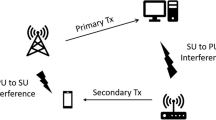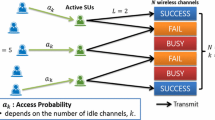Abstract
Consider a multi-channel Cognitive Radio Network (CRN) with multiple Primary Users (PUs), and multiple Secondary Users (SUs) competing for access to the channels. In this scenario, it is essential for SUs to avoid collision among one another while maintaining efficient usage of the available transmission opportunities. We investigate two channel access schemes. In the first model, an SU selects a channel and sends a packet directly without Carrier Sensing (CS) whenever the PU is absent on this channel. In the second model, an SU invokes CS in order to avoid collision among co-channel SUs. For each model, we analyze the channel selection problem and prove that it is a so-called “Exact Potential” game. We also formally state the relationship between the global optimal point and the Nash Equilibrium (NE) point as far as system capacity is concerned. Thereafter, to facilitate the SU to select a proper channel in the game in a distributed manner, we design a Bayesian Learning Automaton (BLA)-based approach. Unlike many other Learning Automata (LA), a key advantage of the BLA is that it is learning-parameter free. The performance of the BLA-based approach is evaluated through rigorous simulations and this has been compared with the competing LA-based solution reported for this application, whence we confirm the superiority of our BLA approach.





Similar content being viewed by others
Explore related subjects
Discover the latest articles, news and stories from top researchers in related subjects.Notes
We are grateful to the anonymous Referee who requested this write-up to describe the difference between the earlier version [4] and this present version.
More detailed information concerning the families of potential games can be found in [5]. It is omitted here to avoid repetition. However, since this is central to our study, we will briefly outline the definitions and the relationships between the Exact Potential game and the Ordinal Potential game, where we shall also prove that the games encountered in our study are Exact Potential games.
We refer the reader to [12] for a proof of this statement.
References
Granmo OC (2010) Solving two-armed Bernoulli bandit problems using a Bayesian learning automaton. International Journal of Intelligent Computing and Cybernetics 3(2):207–234
Granmo OC, Glimsdal S (2013) “Accelerated Bayesian learning for decentralized two-armed bandit based decision making with applications to the Goore game. Applied Intelligence 38(4):479–488
IEEE 802.22 WG (2011) IEEE standard for wireless regional area networks—Part 22: Cognitive wireless RAN medium access control (MAC) and physical layer (PHY) specifications, Policies and procedures for operation in the TV bands, IEEE Std
Jiao L, Zhang X, Granmo OC, Oommen BJ (2014) A Bayesian Learning Automata-based distributed channel selection scheme for cognitive radio networks. In: Proceedings of IEA/AIE 14, the 2014 International Conference on Industrial and Engineering Applications of Artificial Intelligence and Expert Systems, Kaohsiung, Taiwan, pp 48–57
Monderer D, Shapley LS (1996) Potential games. Games and Economic Behavior 14:124–143
Lakshmivarahan S (1981) Learning Algorithms Theory and Applications. Springer-Verlag, New York
Liang YC, Chen KC, Li GY, Mahönen P (2011) Cognitive radio networking and communications: An overview. IEEE Trans Veh Technol 60(7):3386–3407
Narendra KS, Thathachar MAL (1989) Learning Automata: An Introduction. Prentice Hall
Song Y, Fang Y, Zhang Y (2007) Stochastic channel selection in cognitive radio networks. In: IEEE Global Telecommunications Conference, Washington DC, USA, Nov, pp 4878–4882
Thompson WR (1933) On the likelihood that one unknown probability exceeds another in view of the evidence of two samples. Biometrika 25:285–294
Tuan TA, Tong LC, Premkumar AB (2010) An adaptive learning automata algorithm for channel selection in cognitive radio network. In: Proceedings of the IEEE international conference on communications and mobile computing, Shenzhen, China, pp 159–163
Xu Y, Wang J, Wu Q, Anpalagan A, Yao Y-D (2012) Opportunistic spectrum access in unknown dynamic environment: A game-theoretic stochastic learning solution. IEEE Trans Wirel Commun 11(4):1380–1391
Zhang X, Jiao L, Granmo OC, Oommen BJ (2013) Channel selection in cognitive radio networks: A switchable Bayesian Learning Automata approach. In: Proceedings of PIMRC’13, the 2013 IEEE international symposium on personal, indoor and mobile radio communications, London, UK , pp 2372–2377
Author information
Authors and Affiliations
Corresponding author
Additional information
A preliminary version of some of the results of this paper was presented at IEAAIE-2014, the 27th International Conference on Industrial, Engineering and Other Applications of Applied Intelligent Systems, Kaohsiung, Taiwan, in June 2014. [4].
Rights and permissions
About this article
Cite this article
Jiao, L., Zhang, X., Oommen, B.J. et al. Optimizing channel selection for cognitive radio networks using a distributed Bayesian learning automata-based approach. Appl Intell 44, 307–321 (2016). https://doi.org/10.1007/s10489-015-0682-x
Published:
Issue Date:
DOI: https://doi.org/10.1007/s10489-015-0682-x





